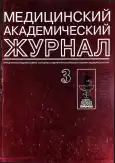Effect of amino acids and antibodies to nerve growth factor low-affinity receptors on the lymphoid tissue culture
- Authors: Chalisova N.I.1, Zakutskiy A.N.2, Aniskina A.I.2, Polyakova V.О.2, Filippov S.V.2, Zezyulin P.N.2
-
Affiliations:
- I. P. Pavlov Institute of Physiology of the Russian Academy Sciences
- St. Petersburg Institute of Bioregulation and Gerontology of the North-Western Branch of the Russian Academy of Medical Sciences
- Issue: Vol 6, No 3 (2006)
- Pages: 57-63
- Section: Basis medicine
- Published: 25.08.2006
- URL: https://journals.eco-vector.com/MAJ/article/view/693544
- ID: 693544
Cite item
Abstract
The effect of L-amino acids in concentration 0.05 ng/ml was investigated in organotypic tissue culture of spleen in rats at age 3 months old. The high molecular and low hydrophobic amino acids - asparagine, lysine and glutamine acid are active, inducing more intensive growth zone in explants, as compared to control at the presence of the antibodies to nerve growth factor (NGF) low-affinity receptors (NGFRp75), being the apoptosis inductors. In the contrast another group of low molecular and high hydrophobic amino acids which was active, inducing a less intensive growth zone and more p53 expression inhibition, produced at NGFRp75 presence the delay of the inhibition effect. These amino acids can mediate the apoptosis-induced effect by means of NGFRp75. The data obtained can be used by the synthesis of the novel bioregulator peptides.
About the authors
N. I. Chalisova
I. P. Pavlov Institute of Physiology of the Russian Academy Sciences
Author for correspondence.
Email: shabanov@mail.rcom.ru
Russian Federation, St. Petersburg
A. N. Zakutskiy
St. Petersburg Institute of Bioregulation and Gerontology of the North-Western Branch of the Russian Academy of Medical Sciences
Email: shabanov@mail.rcom.ru
Russian Federation, St. Petersburg
A. I. Aniskina
St. Petersburg Institute of Bioregulation and Gerontology of the North-Western Branch of the Russian Academy of Medical Sciences
Email: shabanov@mail.rcom.ru
Russian Federation, St. Petersburg
V. О. Polyakova
St. Petersburg Institute of Bioregulation and Gerontology of the North-Western Branch of the Russian Academy of Medical Sciences
Email: shabanov@mail.rcom.ru
Russian Federation, St. Petersburg
S. V. Filippov
St. Petersburg Institute of Bioregulation and Gerontology of the North-Western Branch of the Russian Academy of Medical Sciences
Email: shabanov@mail.rcom.ru
Russian Federation, St. Petersburg
P. N. Zezyulin
St. Petersburg Institute of Bioregulation and Gerontology of the North-Western Branch of the Russian Academy of Medical Sciences
Email: shabanov@mail.rcom.ru
Russian Federation, St. Petersburg
References
- Белокрылое Г. А., Деревнина О. Н„ Попова О. Я. и др. Различия в иммунном ответе, фагоцитозе и детоксицирующих свойствах под влиянием пептидных и аминокислотных препаратов // Бюл. эксп. биол. мед. 1995. Т. 118. № 2. С. 509-512.
- Замятнин А. А. Аминокислотный состав эндогенных физиологически активных олиго-пептидов // Доклады Академии наук. 1987. Т. 292(5). С. 1261-1264.
- Канонов В. Н. Биология фактора роста нервной ткани. Минск, 1986 (Наука и техника).
- Чалисова Н. И., Комашня А. В. Модулирующее действие аминокислот в органотипической культуре лимфоидной ткани // Биоорган, хим. 2006. Т. 32. № 3. С. 293-299.
- Чалисова Н. И., Пеннияйнен В. А. Модулирующая роль незаменимых и заменимых аминокислот в органотипической культуре тканей у крыс разного возраста // Рос. физиол. журн. им. Сеченова. 2003. Т. 89 (5). С. 591-597.
- Чалисова Н. И., Пеннияйнен В. А., Ноздрачев А. Д. Регулирующее действие аминокислот в органотипической культуре лимфоидных тканей с различной степенью зрелости // Доклады Академии наук. 2003. Т. 3 89. № 2. С. 117-119.
- Чалисова Н. И., Хавинсон В. X., Ноздрачев А. Д. Модулирующий и протекторный эффект пептидов тимуса в культуре лимфоидной ткани // Доклады Академии наук. 1999. Т. 379. № 3. С.411-413.
- Шатаева Л. К, Хавинсон В. X., Ряднова И. Ю. Пептидная саморегуляция живых систем. СПб.: Наука, 2003.
- Cheema S. S., Barren G. L., Bartlett P. E Reucing p75 nerve growth factor receptor levels using antisense oligonucleotides prevents the loss of axotomized sensory neurons in the dorsal root ganglia of newborn rats /I J. Neurosci. Res. 1996. Vol. 46. № 3. P. 239-245.
- Cid C.. Alvarez-Cermeno J. C., Regidor I. et al. Low concentrations of glutamate induce apoptosis in cultured neurons: implications for amy¬otrophic lateral sclerosis // J. Neurol. Sci. 2003. Vol. 206. № l.P. 91-95.
- Conti A. M., Brimijoin S., Miller L. J. et al. Supression of neurite outgrowth by high-dose nerve growth factor is independent of functional p75 NTR receptors H Neurobiol. Dis. 2004. Vol. 15. № l.P. 106-114.
- Culmsee C., Gerling N.. Lehmann M. et al. Nerve growth factor signaling in cultured hippocampal neurons is mediated through TrkA and requires the common neurotrophin receptor p75 // Neurosci. 2002. Vol. 115. № 4. P. 1089-1094.
- Fratelli M., Gagliardini V., Galli G. et al. Autocrine interleukin-1 beta regulates both proliferation and apoptosis in EL4-6. 1 thymoma cells // Blood. 1995. Vol. 85. № 12. P. 3532-3537.
- Fu Y. M., Yu Z. X., Li Y. Q. et al. Specific amino acid dependency regulates invasiveness and viability of androgen-independent prostate cancer cells //Nutr. Cancer. 2003. Vol. 45. № l.P. 60-73.
- Kim K. Y., Moon J. L. Lee E. J. et al. The effect of L-arginine. a nitric oxide synthase substrate, on retinal cell proliferation in the postnatal rat // Dev. Neurosci. 2002. Vol. 24. № 4. P. 313-321.
- Llansola M.. Bosca L.. Felip V. et al. Ammonia prevents glutamate-induced but not low K(+)- induced apoptosis in cerebellar neurons in culture // Neurosci. 2003. Vol. 117. № 4. P. 899-907.
- Levi-Montalchini R.. Angeietty P. Nerve growth lactor П Physiol. Rev. 1982. Vol. 48. № 1. P. 534-569. '
- Philip R.. Campbell E., Wheatley D. N. Arginine deprivation, growth inhibition and tumour cell death: 2. Enzymatic degradation of arginine in normal and malignant cell cultures И Br. J. Cancer. 1995. Vol. 88. № 4. P 613-623.
- Suschek С. V., Schnjrr O., Hemmrich K. et al. Critical role of L-arginine in endothelial cell survival during oxidative stress H Circulation. 2003. Vol. 107. № 20. P. 2007-2014.
Supplementary files






